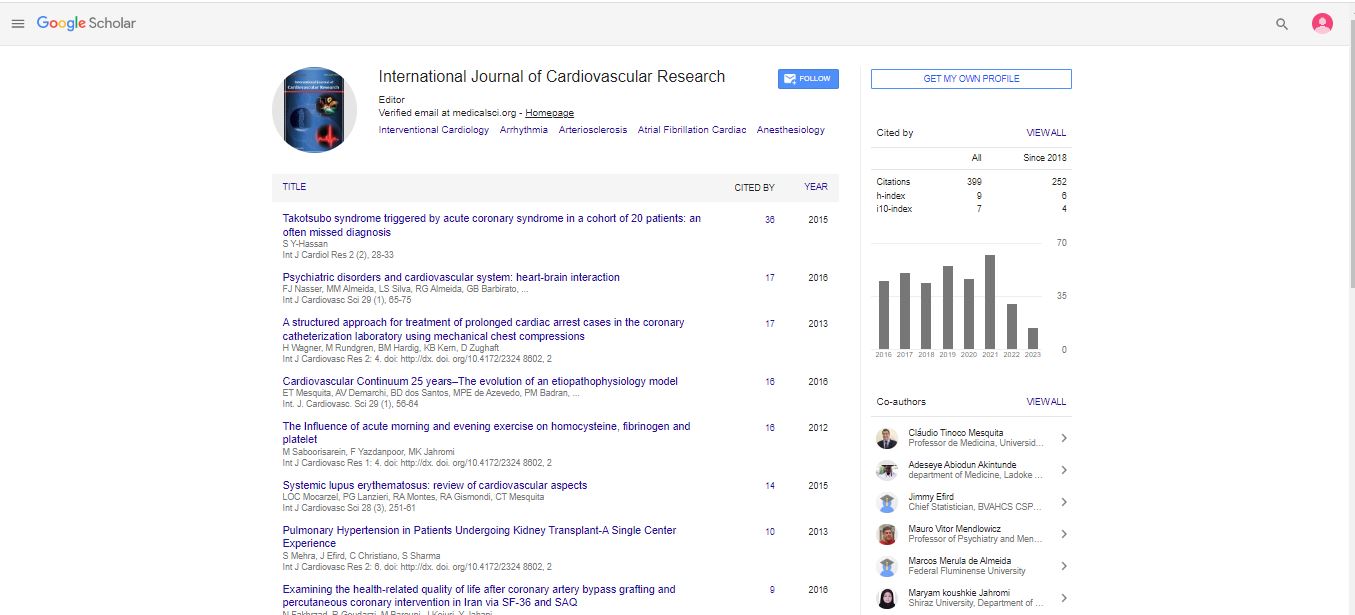Short Communication, Icrj Vol: 10 Issue: 8
Differential Therapy of Myocarditis and Inflammatory Cardiomyopathy
Author name: Heinz-Peter Schultheiss
Abstract
Cardiomyocytes can be destroyed by direct virus damage, the antiviral immune response, or a truly autoimmune injury. Beside an optimal heart failure therapy, the mainstay of treatment for myocarditis and inflammatory cardiomyopathy (CMi) is the biopsy-proven specific immunomodulatory treatment regarding the underlying pathophysiological mechanisms. Chronic viral infections of the heart (mainly Parvovirus B19, Human-Herpes virus (HHV) 6, Coxsackieadeno virus, Ebstein-Barr virus, Cytomegalie virus, and Hepatitis virus) are considered one antecedent event leading to progressive dysfunction of the myocardium, often with an impaired prognosis due to a virus- or immune-mediated myocardial injury. The effectiveness of anti-viral-therapy has been proven in recent studies, showing that enterovirus/ adenovirus – positive patients benefit from anti-viral therapy with interferon beta-1b, whereas in patients suffering from parvovirus B19 infection no established therapy exists.
Introduction: Cardiomyocytes can be destroyed by direct virus damage, the antiviral immune response, or a truly autoimmune injury. Beside an optimal heart failure therapy, the mainstay of treatment for myocarditis and inflammatory cardiomyopathy (CMi) is the biopsy-proven specific immunomodulatory treatment regarding the underlying pathophysiological mechanisms. Chronic viral infections of the heart (mainly Parvovirus B19, Human-Herpes virus (HHV) 6, Coxsackieadeno virus, Ebstein-Barr virus, Cytomegalie virus, and Hepatitis virus) are considered one antecedent event leading to progressive dysfunction of the myocardium, often with an impaired prognosis due to a virus- or immune-mediated myocardial injury. The effectiveness of anti-viral-therapy has been proven in recent studies, showing that enterovirus/ adenovirus – positive patients benefit from anti-viral therapy with interferon beta-1b, whereas in patients suffering from parvovirus B19 infection no established therapy exists. However, the nucleoside analogues Telbivudine seems to be a promising drug in patients with proof of active viral replication. Follow-up studies revealed an association with HHV6 and the clinical course of myocarditis and CMi. HHV-6 is able to integrate its genomes into telomeres of human chromosomes. We recently demonstrated that antiviral therapy with Ganciclovir can diminish HHV-6 replication as well as cardiac symptoms of these patients. Myocardial inflammatory processes due to autoimmunity warrant immunosuppressive treatment in order to prevent immune-mediated myocardial injury. Immunosuppression (treatment with prednisone and azathioprine for 6 months) demands biopsy-based exclusion of virus since virus-positive patients do not improve or even deteriorate under anti-inflammatory treatment, while virus-negative patients with post-infectious, auto-immune inflammatory process respond well in clinical trials, and - after termination - long lasting LVEF improvement has been documented.




